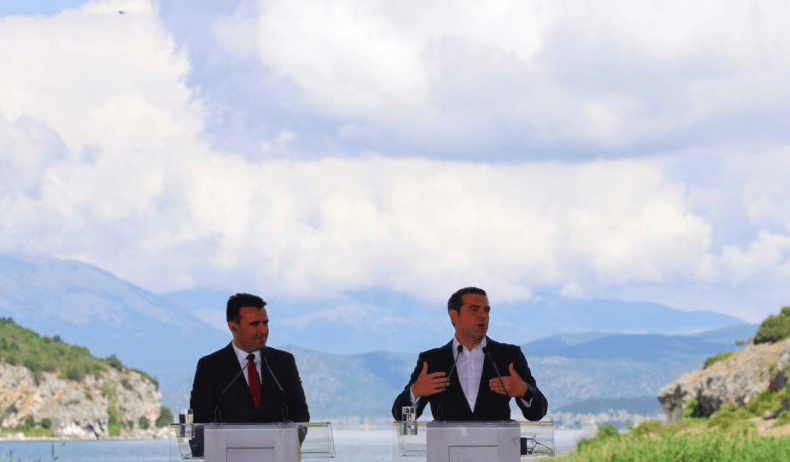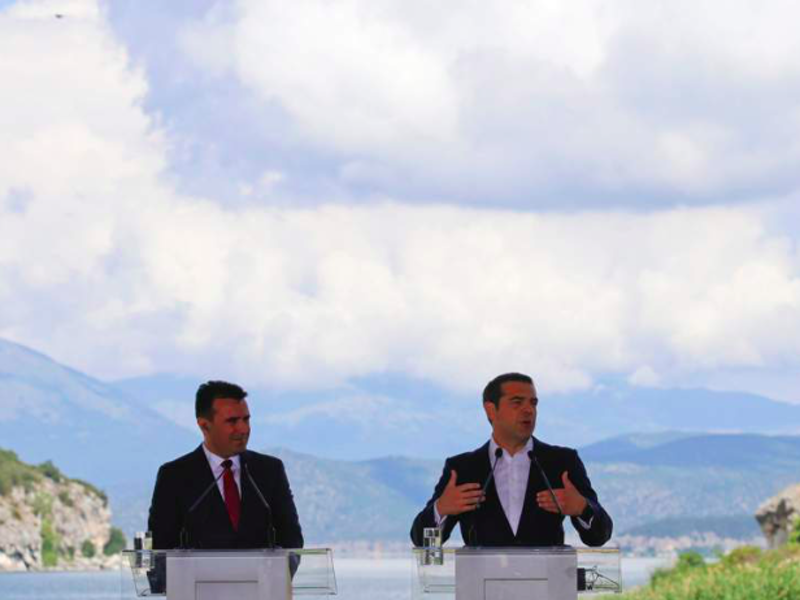
Following the resignation of Defence Minister Panos Kammenos and the departure of the Independent Greeks from the government coalition in protest over the 'Macedonia' name deal, Prime Minister Alexis Tsipras continued to defend and praise the Prespes Agreement at an event on Sunday held at the 'Megaron' Athens Concert Hall.
The Greek PM addressed a crowd at the event titled "The Wager of the Prespes Agreement", and referred to the recent political developments in Greece, noting that were in part the result of the agreement itself.
Earlier, 20 people were detained by police on Sunday afternoon as they prepared to erect a banner asking for a referendum on the Prespes Agreement outside the 'Megaron' Athens Concert Hall, before the start of the event to be addressed by the prime minister. They were taken to the Attica General Police Headquarters.
"When I gladly accepted the invitation to speak here, I could not imagine that the day that I would be addressing this gathering would have a special symbolism, that it would be a day of intense political developments set in motion by this great change made by the Prespes Agreement, which acts as a catalyst for the country's political system," said Alexis Tsipras.
Reviewing the events that led to the signing of the Prespes Agreement, he harked back to the summer of 2017, when progressive leader Zoran Zaev was elected prime minister of Greece's northern neighbour FYROM.
"We found ourselves faced with a real opportunity but also a crucial dilemma: either to continue the policy of inertia and delays out of fear of the political cost or to make the choice, discounting the political cost, to use this great, historic opportunity created by the existence of two progressive forces at the helm of both countries," the prime minister said.
The government, for the sake of stability but also in support of national interests, decided to do the second and "take on the historic burden," taking the "step beyond" and assuming both the political risk and the political cost of this endeavour, Tsipras added.
"The dilemma was between political cost and the good of the nation," he said.
The Greek government did everything in its power to ensure that the Prespes Agreement included all the parameters that fully assured its adherence with the country's long-standing 'national policy line' on this issue and succeeded, the prime minister said. This was proved by every article in the agreement itself but also by the constitutional amendments that were successfully passed in FYROM, he added.
Tsipras stressed that, after 23 years, Greece's northern neighbour would leave behind both the temporary name 'Former Yugoslav Republic of Macedonia' and, more importantly, its constitutional name "Republic of Macedonia" and adopt the new name "Republic of North Macedonia" - a compound name with a geographical qualifier for use in relations to everyone, within and outside FYROM, fully in line with Greece's demands over the years.
The neighbouring country also accepted that its language, recognised by the United Nations since 1977, was a South Slavic language and that its culture was absolutely unrelated to the ancient Greek Macedonian culture.
In addition, Tsipras said, it had eradicated all hints of irredentism and any reference, even indirect, to a minority.
Lastly, he added, its constitution clearly states that the nationality listed on its travel documents neither defines nor assumes the ethnicity of the citizens of North Macedonia.
FYROM has met every condition that was officially set as a requirement by the Greek side and others, set by the present government in order to arrive at a mutually acceptable agreement, Tsipras noted.
He attacked main opposition New Democracy and the Movement for Change (KINAL) party for opposing the agreement brokered by his government, accusing them of populism and hypocrisy, and noting that they had supported the self-same positions both inside and outside Greece when in government.
"Some sides reached such a degree of political desperation that they embarrassed themselves globally, adopting far-right conspiracy theories that we supposedly 'traded' the salvation of pensions for a solution to the name issue with our European partners, at the expense of national interests," Tsipras said.
"What we actually did, was to be the first to not trade but rid the country of a 30-year paralytic dominance of nationalism...as Zoran Zaev did on the other side of the border," he added, praising Zaev for not backing down to the nationalist and populist rhetoric and the rallies organised by VMRO in his country.
The Greek government would also not back down, Tsipras underlined:
“ The Prespes Agreement is historic and patriotic and nationally beneficial, because real patriotism is not to hate the countries of others around you but to fight to make your own country a leading force for peace, brotherhood of nations, economic and social progress, in a region and a world that is constantly being destabilised,” he said.
At a time when Europe was falling under the shadow of chauvinism, racism, and bigotry, the message of the Prespes Agreement was even more important, he added, proving that in difficult times “ we can, when progressive forces are in power, turn our backs on nationalism.”
The prime minister referred to the very real danger posed by the far-right in Europe, which had become not an invisible threat but a nightmarish reality that posed a danger to the existence of the European idea and was vying for governmental power.
“ Under the banner of the ‘cultural purity’ of Europe, this New Far Right targets, persecutes and recruits racist violence against those fleeing wars and world poverty...It spreads hatred and fear, disinforming with a torrent of conspiracy theories and fake news,” Tsipras said, while noting that this far right had been cultivated by policies that had alienated Europeans from the European process, policies that had increased inequality and social exclusion, violating the post-war social contract and dismantling European solidarity.
Mitsotakis’ ‘guilty silence’ indicates complicity, PM says
The prime minister openly accused main opposition New Democracy leader Kyriakos Mitsotakis of tolerating, if not actually encouraging, attempts to threaten MPs so that they would not support the Prespes Agreement.
"In recent days, after seeing that all attempts at disorientation, intimidation and fascistisation were a resounding failure, some stooped to stealing and making public the personal details and telephone numbers of MPs, openly urging their followers to threaten democratically elected representatives of the Greek people,” Tsipras said.
New Democracy and Mitsotakis were linked to such circles in “ the most official way” and, while until recently they had simply tolerated these actions, “ Mr. Mitsotakis guilty silence” and the actions of prominent ND members already being investigated by justice “ prove that he has passed from a stance of tolerance to one or orchestrating and guidance,” the prime minister asserted.

